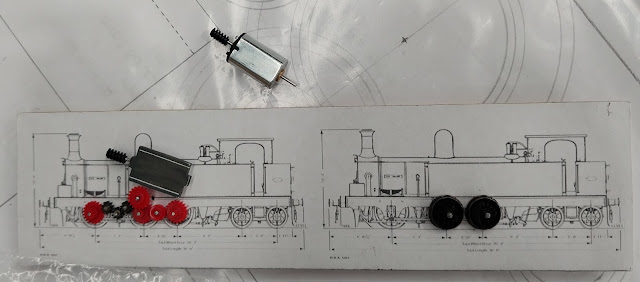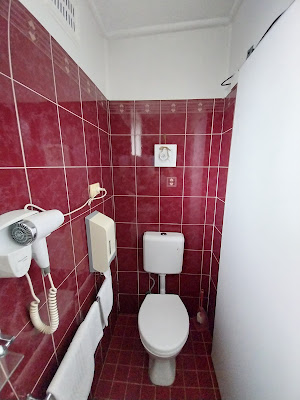A
trio of Railway weekends
At times,
one needs a break from the workbench, with a chance to recharge the batteries,
and learn something new.
Visit to
Bemboka
Rob
Anderson’s new abode in Bemboka was the site of the NMRA Div 2 meeting in
September. It is a significant distance
for me to travel, but Rob’s former layout in the ACT was one that I admired,
and operated, so I was curious to see what he was up to.
After car
pooling via Canberra (the most direct route from Junee is via the Snowy
Mountians Highway, a highway subject to snow, and the forecast was for snow),
we arrived around 11am, with plenty of time for talking with members, prior to
the excellent BBQ lunch. After lunch, we
were invited to inspect Rob’s new layout.
Robs new
train room is around 9×6 metres – similar in size to the area I have. Rob’s layout is also double deck. He had maintained his earlier layout theme –
being a fictional east-coast mainline, from Melbourne VIC, to Eden NSW. Rob had incorporated some design changes from
his original layout – both staging yards were larger, and connected, and no
longer had a duck-under to enter the room.
 |
| Rob is reusing some of his original layout structures to save time |
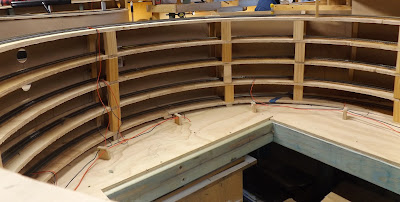 |
| Two helixes are used to raise and lower the main line onto, and off the upper deck. These are symetrically placed in the room near the main entrance |
 |
| Rob is experimenting with lighting. I understand that additional lights will be installed to better illuminate the scenes |
 |
| Train operations are controlled by this signal panel. This is similar to Rob’s original layout |
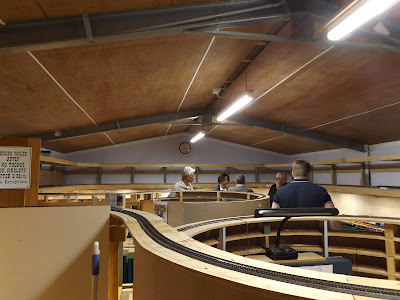 |
| Looking upwards to the roof construction. Both helixes can be seen |
 |
| The lighting pelmet for the upper deck is solid. |
Petes
Hobby Railway.
As part of
the The Junee Roundhouse 75th Anniversary Celebrations, Pete Neve
had arranged to have a running day on October 2nd. As one of Pete’s volunteers, I was tasked to
operate the gate, and provide commentary for members of the public who came to
view the trains. Pete has 2 operational
locomotives, and track which extends from an engineshed, into his
frontyard. The track is hoped to be
extended later to finish a continuous loop.
It was good day, and the weather co-operated.
Goulburn
N scale convention.
Last
weekend, the Australian N scale had their first convention after Covid, and
held at Goulburn, which is a small city about 2 hours from Sydney, and one hour
from Canberra. Goulburn, like Junee,
is a railway town, and boasts a large roundhouse, (now a museum) which was open
for Conventioneers on Friday afternoon. The weather wasn’t good, being in
constant light rain. On display were
many of the locomotives assembled for the previous weekend’s “Streamliner” event. (many of the people visiting Pete’s Hobby
Railway had been to the Streamliners on the preceeding Saturday). I hadn’t been to the Goulburn Roundhouse for
decades, prior to it becoming a museum, so I was curious to what was lurking
inside the sheds.
 |
| Some serious workshop machinery on display – all this clutter can give ideas for convincing engineshed modelling |
 |
| Inside valve gear of a NSW B class mogul, as seen from one of the roundhouse pits |
The
convention itself was great. Lots of good
layouts on display, including Ross Balderson’s Newcastle 1899, which is a
museum standard moving diorama. The
modelling contest had many entries, and the judging this year was done by
popular vote. As I was one of the judges
in 2019 for the N scale convention held in Canberra, I do not think this
particularly good, as the modellers entering the contest do not get
constructive feedback. The upside was
that it is a lot simplier, and the judges get to go to all the clinics.
 |
| Around 40 entries in the competition. The locomotive category was won by Stephen Curry with his Kitson tank locomotive (#21 on the sheet above) |
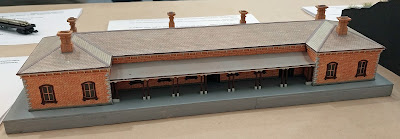 |
| The Castlemaine (Victoria) station won the popular vote for the structures section |
 |
| This small Inglenook layout was the focus (pun intended) for the “Using your phone camera for layout photography” clinic. |
 |
| An interesting construction technique, just using foam. |
 |
| The N scale Japanese themed layout was just one of 9 layouts on display at the convention |
The clinics
were wide and varied – and most were not scale specific. To me the one on use of phone cameras for
model photography was useful, but the one from Ross Balderson on Streetscapes,
including the talk about the Horse Manure panic of 1894, and a method to model
horse dung most amusing.
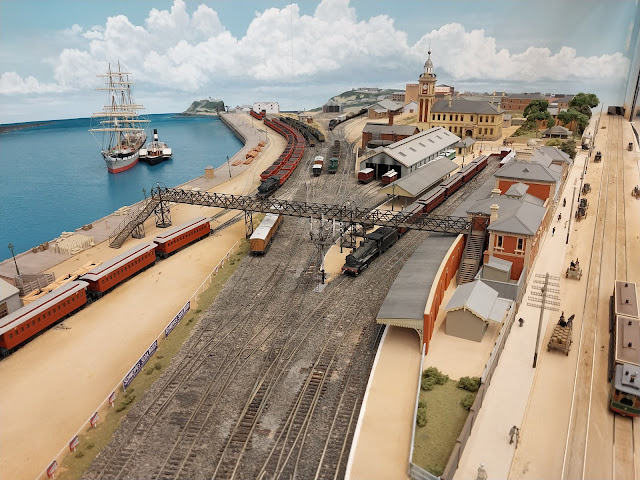 |
| I have shown Ross Balderson’s “Newcastle 1899” before on this blog, but the updates keep making it better. |
Being N
scale, I didn’t think I would be tempted to buy anything. But some DCC chips, and 3D printed in colour
HO people will be used for a future blog post.
And I was also successful in selling my N scale Bachmann excursion
coaches that I bought for testing the N scale Bethungra layout I built for the
Junee Broadway Museum
And a bonus
for me was that the cheap motel I stayed at, had an ensuite that very closely
matches the dimensions of the ensuite I am proposing for my train room
area. Having pictures will assist me in
describing to the builder what I am needing.

































